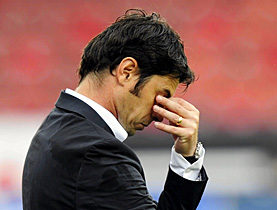FC Grasshopper face bounce out of top flight

One of Switzerland's best known football clubs, FC Grasshopper Zurich, is threatened with relegation from the top league next season because of acute financial difficulties.
The most successful club in Swiss history has been struggling to contain debt for a number of years and is reportedly running out of benefactors to keep it afloat beyond the current season.
Grasshopper president Roger Berbig is now painting a bleak picture for the club after talks to rope in the millions of retail entrepreneur Philippe Gaydoul broke down in the summer.
Berbig suggested that the club’s current sugar daddy, garden centre magnate Heinz Spross, is running close to the limit of his funding power.
“I can imagine that at some time he will also have had enough,” Berbig told the Neue Zürcher Zeitung newspaper. “The situation has been acute for months.”
FC Grasshopper have remained tight-lipped over the exact depth of their debt, but observers calculate the club owes SFr10-20 million ($9.4-19 million) and growing. According to Swiss Football League (SFL) rules, clubs are only granted a licence to play in the top flight if they can prove sound finances or have a backer for their debts.
SFL spokesman Roger Müller told swissinfo.ch that the League is monitoring the situation at FC Grasshopper.
“We do not see any financial crisis this season and we expect them to play as normal. However, we do take it seriously when we see reports that they could lose investors at the end of the season.”
Shockwaves
FC Servette, from Geneva, was forced to drop to a lower league in 2005 after failing to meet SFL financial rules, the same fate that befell Lausanne three years earlier. However, the shockwaves would resonate much further if such a large and prestigious club as FC Grasshopper were to meet the same fate.
Grasshopper’s problems mirror a wider picture for smaller clubs in many European countries. The increased attention and revenues from television has swelled football’s coffers, but money has been mainly distributed to the bigger clubs with greater audience appeal.
Swiss football cannot compete with countries such as England, where Sky television stumps up billions to show matches. The SFL runs on an annual budget of SFr15.7 million from television and marketing revenue combined.
While Real Madrid can afford to pay £80 million (SFr139 million) for Ronaldo, Grasshopper regularly loses rising stars to bigger leagues as they struggle to keep afloat financially.
Not even the substantial financial bonus of qualifying for a European competition is necessarily enough in the long run, as FC Thun found out. The small Bernese club netted millions in the Champions League in 2005, but soon frittered the cash away and now languish in the lower leagues.
FC Grasshopper’s problems have been exacerbated by the lack of a home stadium. Their old ground, the Hardturm, was knocked down before the Euro 2008 championships and they now share rivals FC Zurich’s stadium as a planning quagmire holds up the rebuilding of their home turf.
Realistic policy?
Part of the club’s problems has been cutting its cloth to meet its current circumstances, according to Swiss football journalist Guido Tognoni. FC Grasshopper’s glory days are now a distant memory as the club struggles to mount a serious challenge for honours.
“They still believe that they are the biggest and greatest club and have been unable to reduce their budget,” Tognoni told swissinfo.ch. “They are now in a very messy situation with no stadium, no money and few good players.”
Grasshopper’s only hope appears to be to find salvation in the shape of a rich benefactor, such as Gisela Oeri – wife of a Swiss billionaire – who funds FC Basel.
But Swiss money appears more willing to go abroad at the moment. Former Swiss international turned entrepreneur Ramon Vega appeared willing to invest in English club Portsmouth – before pulling out – while Swiss investor Markus Liebherr decided to sink his cash into rival Southampton in July.
“Swiss football has no image outside Switzerland so there is no prospect of a return on investment,” Tognoni said. “Even the poorest English team has a better global image.”
Matthew Allen, swissinfo.ch in Zurich
FC Grasshopper is one of Switzerland’s oldest clubs and the most successful in the country’s domestic game. Founded in 1886 by English student Thomas E Griffith, the club has collected 27 league titles and 18 cup victories.
At the height of the club’s powers in the later 1970s and early 1980s, it regularly featured in prestigious European tournaments.
Former star players have included German national star Günter Netzer, Alain Sutter, Christian Gross, former Swiss national captain Johann Vogel and the Yakin brothers, Hakin and Murat.
Grasshopper Club Zurich is best known for its football, but the umbrella organisation also encompasses other sports such as rowing, ice hockey, tennis, curling and squash.
Fans are reportedly trying to dig the football club out of its financial hole by organising an online collection of SFr1 million. Swiss media reports that a Facebook group has collected SFr300,000.
But another unusual funding channel, the long running and famed Thursday Club of private donors and businesses, appears to have lost some of its impact as a result of the financial crisis.

In compliance with the JTI standards
More: SWI swissinfo.ch certified by the Journalism Trust Initiative













You can find an overview of ongoing debates with our journalists here . Please join us!
If you want to start a conversation about a topic raised in this article or want to report factual errors, email us at english@swissinfo.ch.